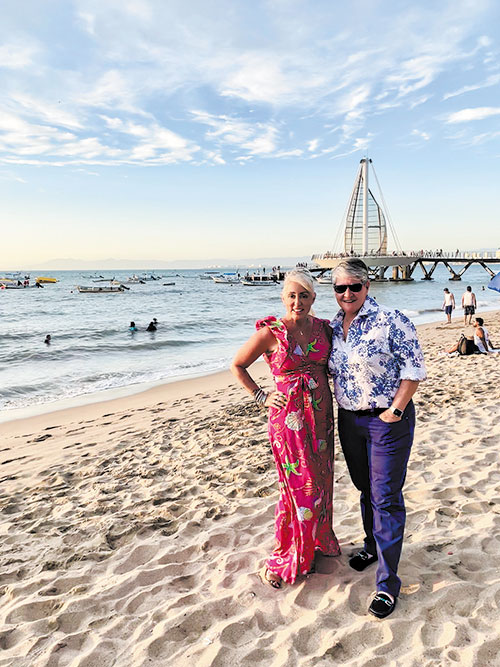Focusing on real communication
Two American lesbians and six French Canadians walk into a Japanese restaurant in Puerto Vallarta, Mexico. No, really.
My wife and I were in Mexico recently to celebrate a friend’s 50th birthday. We were supposed to be there for a long weekend; we turned it into a long week (read, eight days) instead. One night we decided to mix things up and have dinner at a teppanyaki restaurant. You know — the ones where they seat you with other guests if your party doesn’t fill the whole table?
As we were walking in, we passed a chic-looking family taking photos outside the restaurant. They were speaking something other than Spanish or English, so I didn’t interrupt to ask if I could take the photo for them as I usually do.
When we got inside, we were seated and moments later the family joined us. They smiled and nodded at us and said hello. My wife excused herself to the ladies’ room.
 One of the men asked me, “Do you speak French?” “No,” I said. “I’m afraid not. And when my wife gets back to the table, she will tell you, ‘Un petit peu.’ But that isn’t true.”
One of the men asked me, “Do you speak French?” “No,” I said. “I’m afraid not. And when my wife gets back to the table, she will tell you, ‘Un petit peu.’ But that isn’t true.”
They all laughed, and I sighed with relief, assuming that meant they spoke fluent English. That, it turns out, was not the case. At all.
One of the men spoke reasonably good English; another — a bit. The others — very little.
“This is going to be interesting,” I thought.
At first, I figured they might keep to themselves, and the two of us would simply keep to ourselves. But that’s not really who my wife and I are. And, it turns out, it’s not really who this family was either.
So, the man who I was seated next to and I did our best. It was interesting because they spent a good bit of time deciding who would sit where, and I realized then that at least part of that was about seating the English speaker next to the Americans. Incredibly thoughtful and très French, I thought.
Something very interesting happened that night: We communicated. I don’t mean we simply talked. I mean we communicated. We spoke, and we listened, and we understood, and we assured understanding. It was fascinating and enthralling and incredibly satisfying.
The man who I was sitting beside would translate for his wife who would then share with the man next to her and his wife. The other man did appear to speak English as well. But there was the issue of the table length, too.
He and I would speak with intention, carefully choosing our words and examples so we could be understood, and we were both so delighted when we did.
We all seemed to be able to talk and laugh and enjoy one another’s company and get to know one another despite the intense language barrier.
At one point, my wife and I both looked at our watches when we got an alert at the same instant and then looked at each other and laughed. Our watches were telling us to stand up, something that we don’t normally need reminding of but that we found happening a lot on vacation. At the same moment, the woman at the other end of our table said, “Oui, Oui. Stand up,” holding out her Apple watch. She apparently had gotten the notification at the very same instant. It was the strangest point of connection but one which we all delighted over.
We had such a wonderful evening. At the end, the wife of the man I was seated next to said, “I love you very much. I love knowing you.”
I nearly cried. We had barely said a handful of words directly to one another, speaking instead through her husband who translated for us, and yet we made this marvelous connection. She seemed to be truly sad to leave us.
I felt we got to know one another’s spirits. I didn’t want to leave them either.
The evening got me thinking about how much talking we do as couples and yet, all too often, how very little communicating. Unless we have prepared what we are about to say, we generally just, well, talk. And people have a bad habit of not thinking enough before letting out those words and phrases. But what if we really cared that the person to whom we were speaking understood, really understood, what we are trying to say?
What if we were thoughtful with our words? What if we spoke with intention? What if we communicated with one another as if we speak different languages?
Because the truth of the matter is, we all do speak different languages in some ways. Yes, you and your partner might both speak English.
But the words and expressions we choose and how we choose to use them greatly affect how we are understood.
And then there’s the listening. We need to listen to understand not just wait for a chance to speak.
That bears saying again: We need to listen to understand. Not to respond. Not to insert ourselves. But to understand.
One of my favorite things about my relationship with my wife is how we constantly and consistently work to improve how we communicate.
I can’t stand to be interrupted. She comes from a family that talks loudly and over one another. I was offended; she was just doing business as usual. We are learning to meet in the middle.
I like to talk things out to a conclusion in the moment. My wife sometimes needs a minute so she doesn’t say anything she doesn’t mean in the heat of the moment. We are learning to meet in the middle.
I expect to say something once and have it heard and understood and remembered if someone says to me, “Ok.” But when the dogs are barking, and she’s in between conference calls, and the FexEx guy is ringing the doorbell, she might say, “Ok” even if she hasn’t really heard one word I just said. We are learning to meet in the middle.
In any relationship, the middle is where the magic is. It’s the space where you are one. And it’s the thing that allows you to still be two.
Because you know and understand each other, because you actually communicate, because you meet in the middle, you continue to allow yourselves room to change and to grow while never giving up on the perfection of meeting in the middle.













